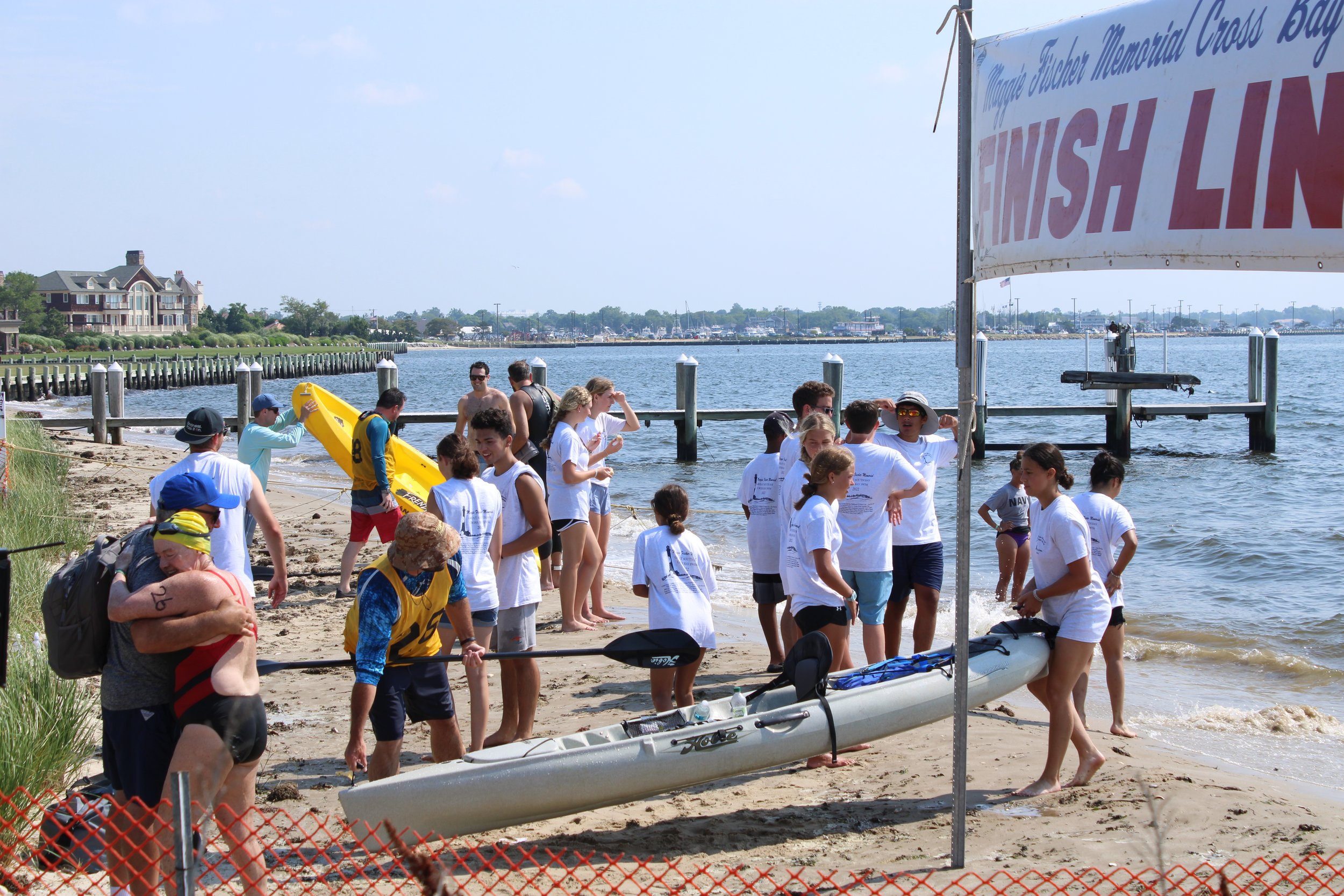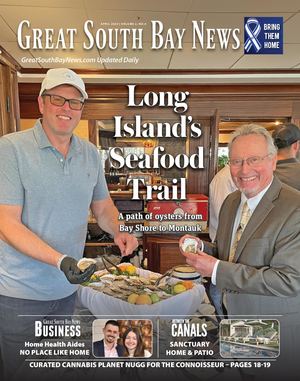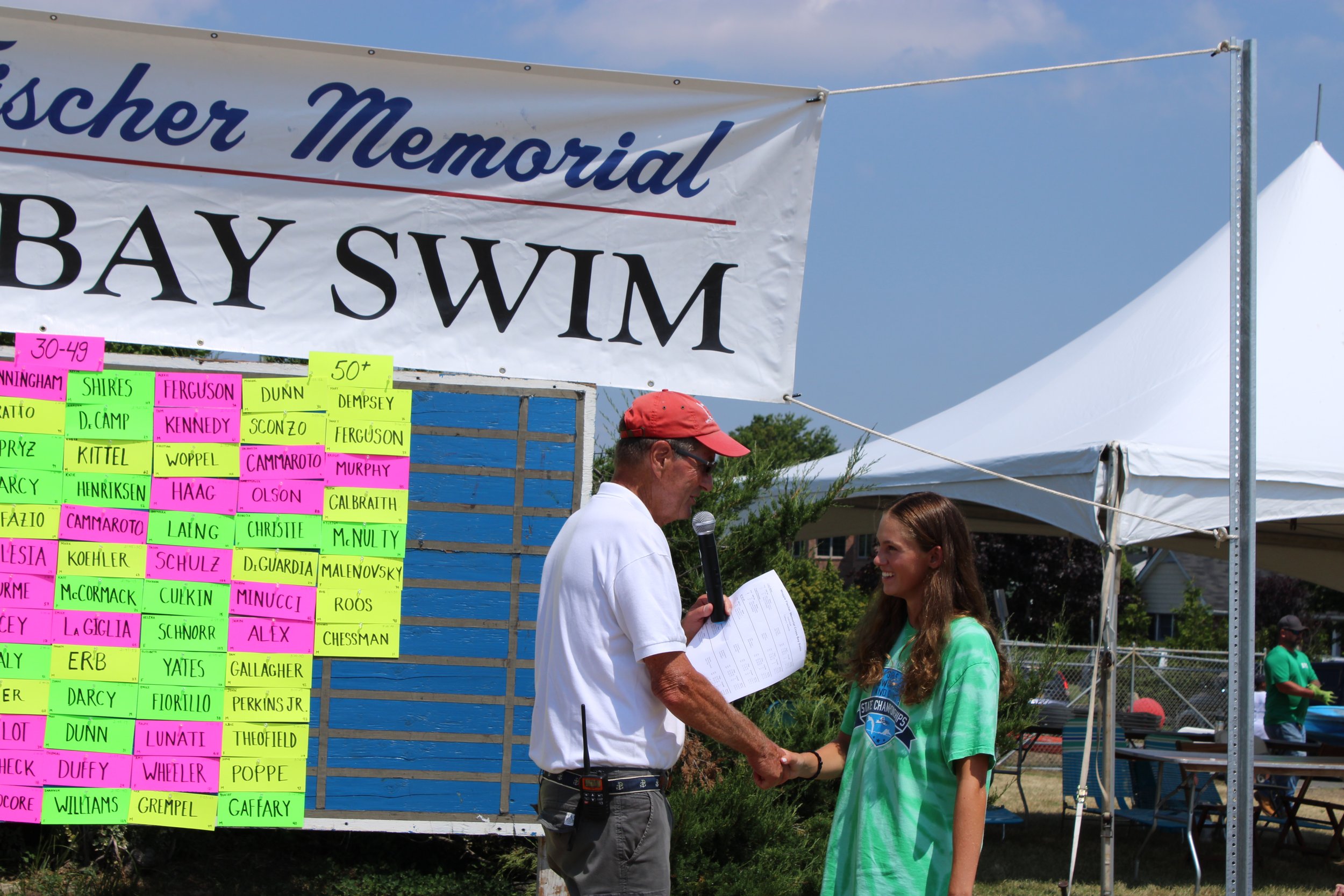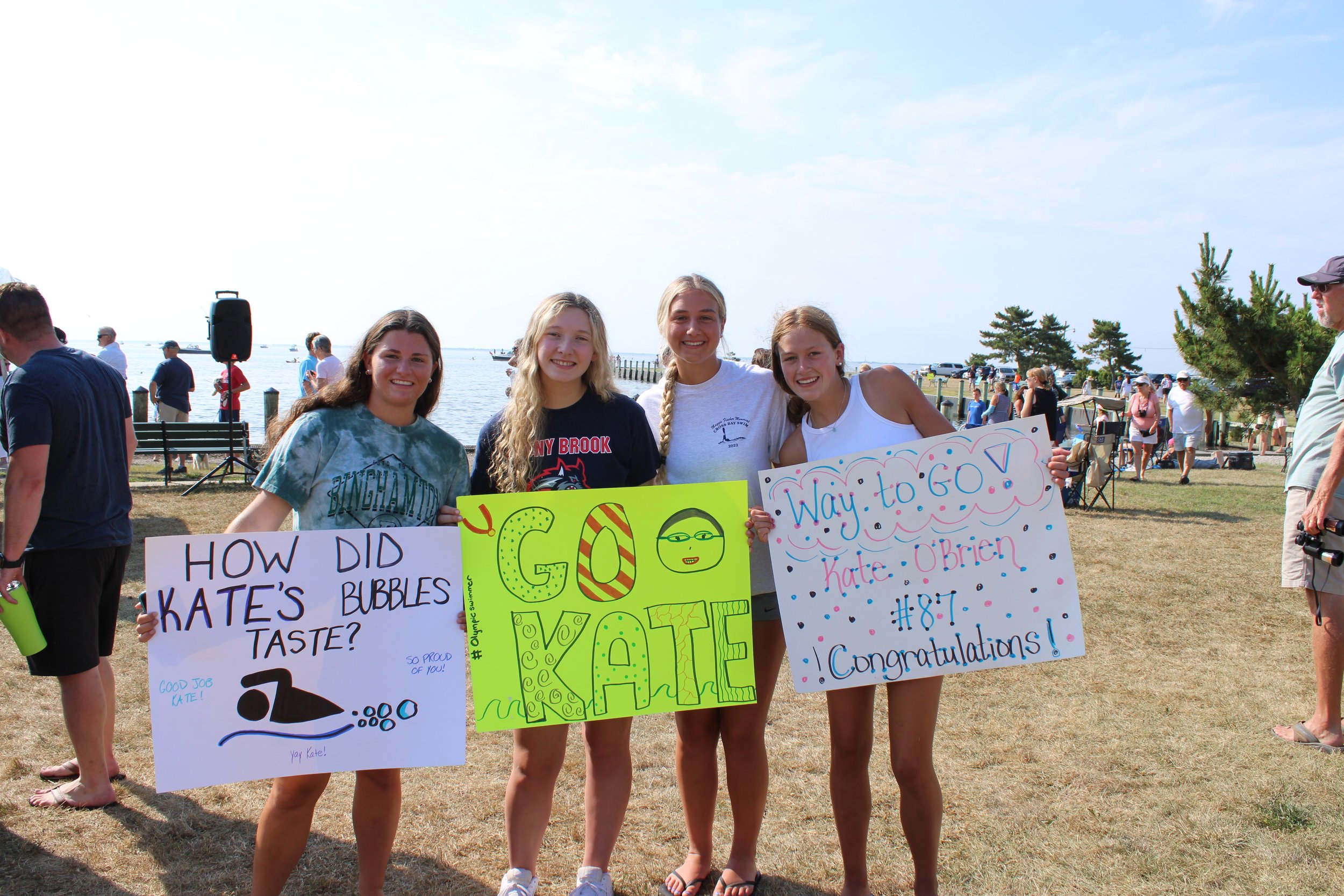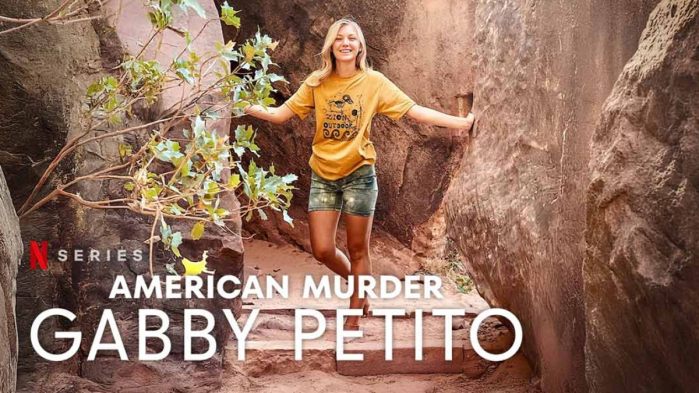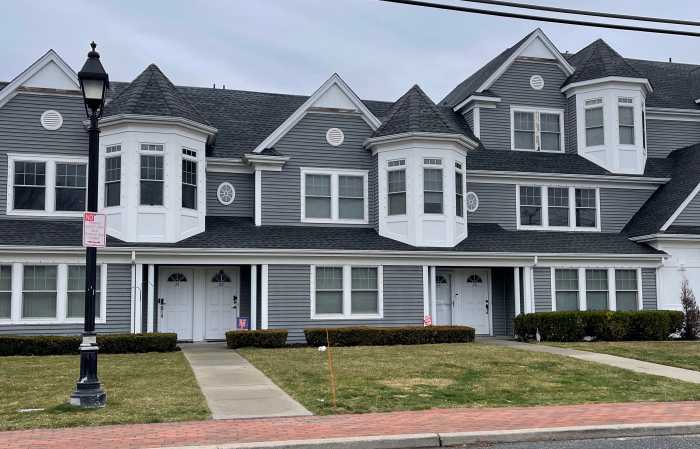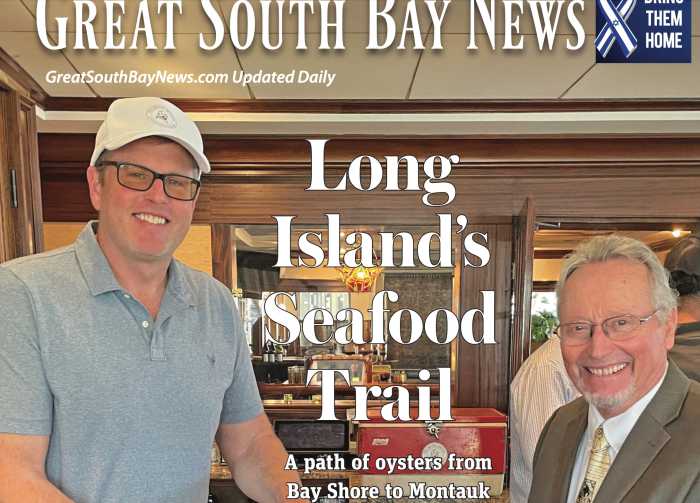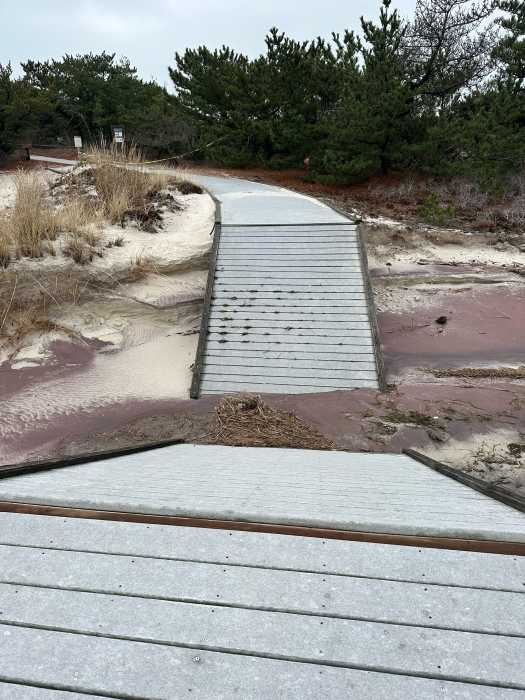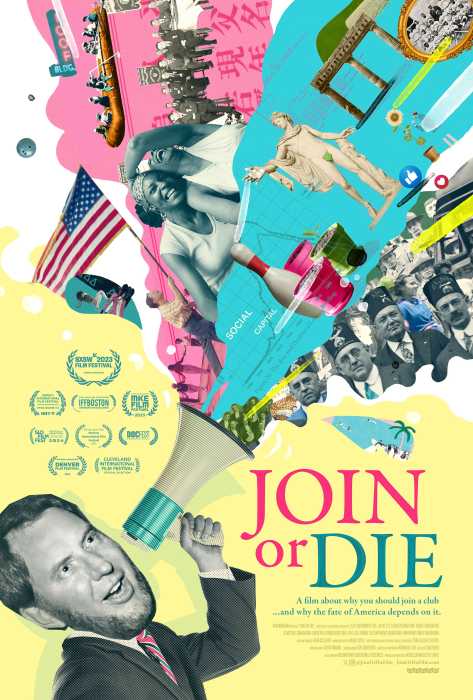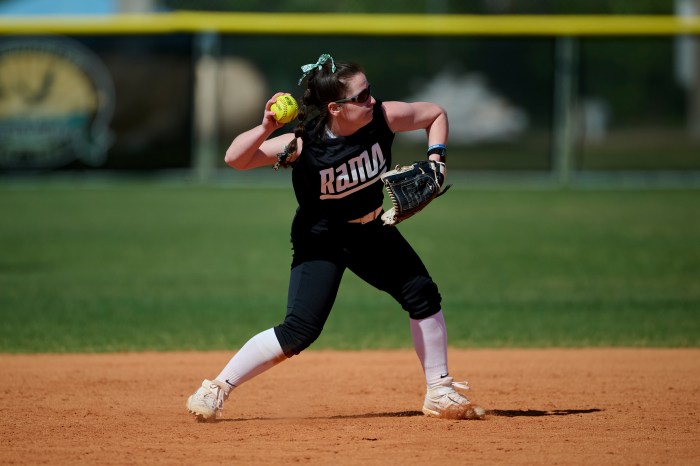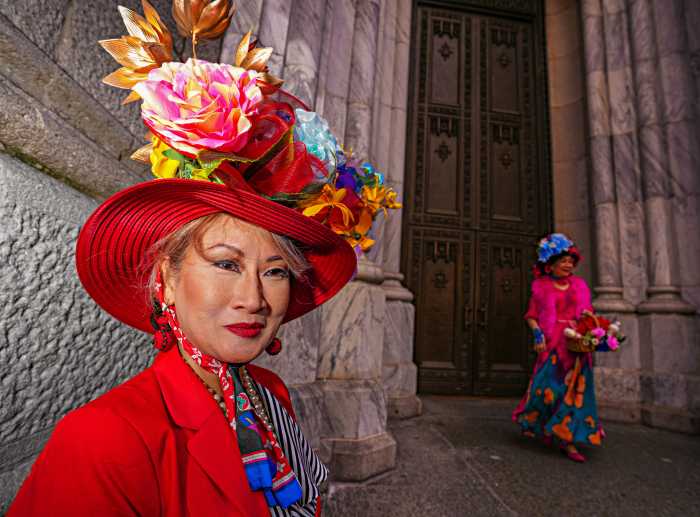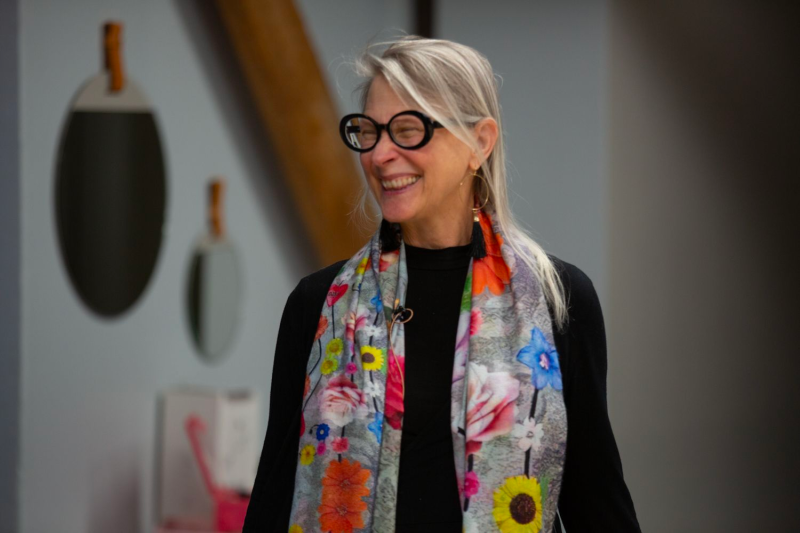
The Maggie Fischer Cross Bay Swim 2022 participants.
By Colleen Vann
The annual Maggie Fischer Memorial Great South Bay Cross Bay Swim took place on Thursday, July 14, and the results were incredible. Around 8:30 a.m., as spectators began to gather at Gilbert Park in Brightwaters, the eight-time emcee MJ Voltz broke news that the first wave of swimmers were approaching the finish.
“I can’t say for sure who’s going to take this,” Voltz said of the five swimmers vying for first place. In the end, Billy Swartwout, 19, crossed the finish line first with a time of 1:39:17. Second place went to 17-year-old Mary McKenna, who beat her previous time by over 10 minutes. McKenna’s time this year was 1:41:44.
This was the second Cross Bay Swim for both McKenna and Swartwout, who noted that the conditions were much better this time. This swim is approximately five and a half miles long and each mile, or stage, comes with a new challenge. Between passing over the sandbar to navigating the choppy waters of West Dickerson’s Channel, an unruly wind or tide can make a big difference. Fortunately, the elements this year were largely in favor of the swimmers.

Billy Swartwout and Bob Fischer as Swartwout receives his trophy.
Swartwout shared his experience: “The beginning was nice; I had a couple of people to race and that really got me in the pace. The middle got a little choppy, so that was a little annoying, but I fought through that and then the current kind of brought me in a little bit towards the end.”
As proud as the onlookers were of the top finishers, what makes this swim so special is that it is a community event. There is genuine pride in and support for each swimmer that crosses that finish line, no matter the time on the clock.
Chris Kittel, 50, is a six-time finisher of the Maggie Fischer Cross Bay swim, completing it in 2:42:54 this year. He was clear that his goal is not to set a record when he swims. It is much more about being “at peace out there.”
First-time swimmer Kate O’Brien, 17, finished second in her division of females aged 16-25 with a time of 1:59:38. She said her goal was to come in under 2:30:00, but that she truthfully would have been proud to just complete the race in general.
“It was very rewarding,” O’Brien said. “The whole time I was like ‘wow, I’m doing something really cool.’”
It isn’t lost on any of the swimmers what the event means beyond the ticking time on the clock. This Cross Bay Swim continually honors the memory of Maggie Fischer, a young St. Anthony’s student and Saltaire lifeguard who was registered to swim the race in 1999 but passed away before she had her chance. That purpose expanded to create the fundraiser for Hospice Children and Family Bereavement Services that exists today.
Maggie’s story and the idea of family bereavement add an emotional element to this event that each swimmer interacts with in their own way. Maggie’s father, Bob Fischer, the head coordinator of the event alongside his wife and son, notes the uniqueness of each participant.
“They all have a story, a beautiful story,” Fischer said.
Some are athletes excited by the challenge and happy to have the charitable element attached. Others have more emotional and personal motivators. For example, the tradition of swimming in honor of loved ones has grown over the years.
The date of this year’s swim fell on the anniversary of Kittel’s mother-in-law’s passing. Her name was Ellen McFadden, and as Kittel approached shore, Voltz read his bio, which included that he crossed the Great South Bay in McFadden’s honor this year. There were plenty of other swimmers who dedicated their journey through the water to the memory of a lost loved one or to the bravery of those who have successfully battled cancer.
Stand-out themes of this event are family, tradition and community. Oftentimes, a swimmer’s kayaker is a member of their family, which takes the idea of a supportive family to a new level.
Annie Fiorillo kayaked for her sister and shared that “it’s pretty rewarding to be able to watch her throughout the whole race and support her.” She added that she thinks the Maggie Fischer Swim “will be somewhat of a tradition in our family.”
The Fiorillo family wouldn’t be the first to have such a tradition. Many swimmers were first introduced to the event by their own family members who competed in the past. The Cross Bay Swim has been occurring since at least 1950 but was dedicated to Maggie Fischer in 1999. Swartwout won the Cross Bay Swim exactly 50 years after his father first completed the race, making his win even more meaningful to him.
There is also an emphasis on community, which is arguably just a different version of a family. From swimming and supporting to organizing, Voltz emphasized that “it really does take a village.”
Fischer further indicated the need for community involvement when he said, “You can only imagine how complicated it is to run an event with over 100 swimmers, about 300 volunteers and 5.6 miles of water separating the start and finish lines.”
MaryCatherine Gutmann is a board member of at least five years. She noted the beauty of getting more people involved. Many of the volunteers are Girl Scouts, who help with things like carrying in the kayaks from shore and passing out swimmer bags as competitors cross the finish line.
“You get everyone involved,” Gutmann said. “Plus, you grow up with a lot of these people. It turns almost into a family thing.”
There are a few kinds of ‘families’ present at the Maggie Fischer Swim. There are those there to support their family members as they swim. And there are also support systems that function as a family. The St. Anthony’s swim team is a huge presence at the event, all there to support one another and continue to honor Maggie Fischer’s memory.
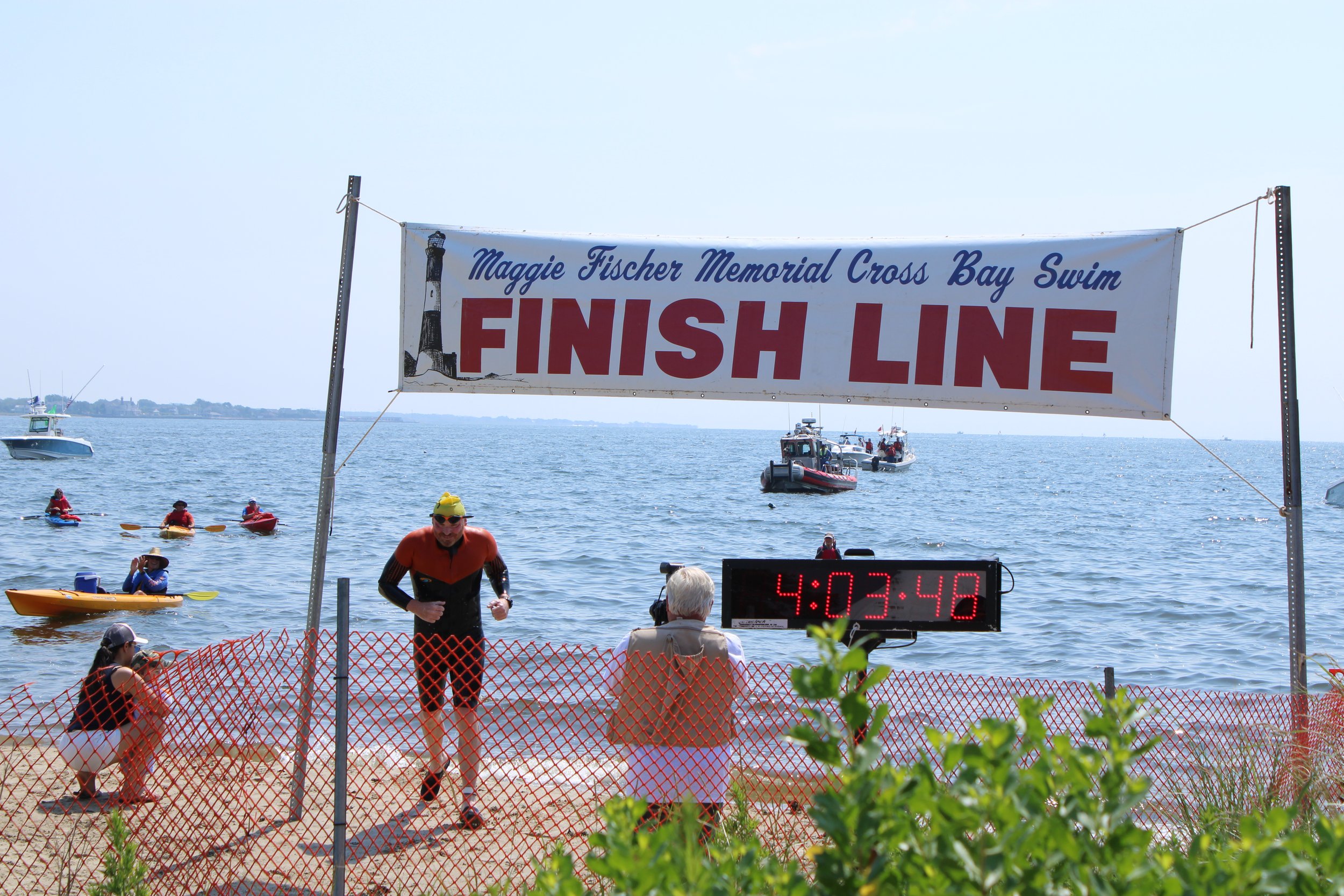
Ed Chessman crossing the finish line as he is cheered on by volunteers, fellow swimmers, spectators and boaters.
Finally, there is the family consisting of all those who are involved in this incredible event. Yes, it is a race, but at the same time, everyone is in it together. That fact was most evident when everyone gathered on the shoreline to cheer on Edward Chessman, the final finisher, as he made his way to shore. Chessman was later awarded the Best Endurance award.
When Voltz reminisced on the moments that mean the most each year, she was quick to say: “Ed crossing was this year’s moment.”
Voltz reflected on the inspiration that she feels when she watches the final swimmers cross the finish line. Some years there are paraplegics or amputees. No matter who it is or how long it takes, each swimmer to successfully cross the Great South Bay is inspiring and will feel the support of all those gathered at Gilbert Park.
And much like the swimmers, Fischer acknowledges the toll that the annual event has on him and his family.
“My wife and I are exhausted when it is over, but there is no greater satisfaction anyone can experience than this.”
This year’s swim successfully raised $80,000 so far, a total that will continue to rise through the end of the year. A link to the race results is available here.

